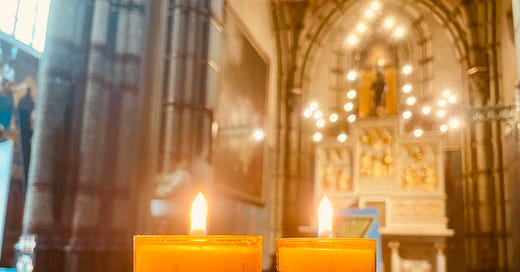A Dominican at the Airport
Picture this: I’m standing at Schiphol Airport in my Dominican habit, waiting for a friend. I thought, “This will make it easier for him to spot me in the crowd!” After all, a Dominican at an airport isn’t exactly an everyday sight. But before long, people began approaching me.
“Ah, how was the flight from Rome? Did the cardinal arrive yet?”
The first time, I smiled politely, assuming it was just a mix-up. By the third time, I started glancing around, half-expecting a procession of bishops to appear. By the fifth time, I turned to a lady and asked, “Why are you asking me about the cardinal?” She laughed and said, “Oh, with that outfit, I figured you’d just flown in from Rome!”
Apparently, in the eyes of the world, wearing a habit comes with its own itinerary. I can only hope that wherever he is, the cardinal got his luggage without having to field questions about me!
Waiting and Anticipation
When I arrive at the airport to meet a friend, I’m surrounded by the endless motion and noise of people hurrying off to somewhere—yet I, myself, am going nowhere. Amid all the commotion, I feel an odd stillness, tethered to the task of waiting. It’s as though time pauses around me, and I scan the crowds for any sign that my friend has landed. Searching faces for recognition, my emotions swing between mild anxiety and a quiet, growing joy.
As the minutes pass, the anxiety melts into something else: hope and anticipation. Waiting transforms into a moment filled with joy—the joy of expecting to see someone dear to me. Soon, very soon, our paths will cross again. He’s just around the corner.
Friendship and Resistance
In “Kindred Spirits: Friendship and Resistance at the Edges of Modern Catholicism”, Brenna Moore explores the idea of spiritual friendship as a worldview during dark times. The book focuses on a group of friends gathered around Jacques and Raïssa Maritain before, during, and after the Second World War. Moore widens the lens of better-known philosophical histories about the Jacques and Raïssa Maritain, highlighting often-overlooked female academics (Mary Kahil, Gabriela Mystral, Simone Weil). These women helped create an international network of spiritual resistance to fascism in the 1930s and 40s, alongside leading theologians (Chenu, Danielou, Journet), who later played pivotal roles in the Second Vatican Council.
What struck me most was the way spiritual friendship connected the figures Moore studied. This concept has a deep history in Christian thought, though in recent years, it has been viewed with suspicion due to scandals within the Church. However, Moore convincingly argues that we can’t impose modern notions of gender and sexuality onto historical figures like the Maritains. Such an approach would miss the essence of what spiritual friendship meant to them.
Enduring Relevance
For the Maritains and their friends, spiritual friendship was a safe haven in a world where they struggled to belong—whether in the Church or in a society dominated by nationalism and fascism. As intellectuals, anti-fascists, and unconventional individuals, they often found themselves marginalised. The philosopher Simone Weil, for example, never sought baptism despite her mystical encounters with Christ. She believed her vocation included standing as a reminder of those outside the Church.
Spiritual friendship is not some magical antidote to the evils of the world. Yet, when all seemed lost, these friends found that their shared connections kept them going. Their hope and faith were sustained by the discovery that in the depth of their friendships, they could also find a path to God.
Friendship as Hope
Pope Francis will inaugurate the Jubilee Year of 2025 in a few weeks with the theme Pilgrims of Hope. Not everyone will travel to the Eternal City; some may even struggle to find hope within their local churches. But as Moore’s work reminds us, hope often begins as a small flame kindled in our friendships with others.
Take care of your friends, for in those friendships, you may uncover the hope you’re searching for—and perhaps even find your way back to God. He is just around the corner.




